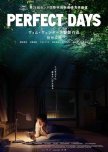On a quiet day, when I need to feel grounded in something purely human...
Perfect Days is not a film for everyone—but for those who connect with it, it offers something profoundly moving. It’s meditative, quiet, and incredibly human, focusing not on what happens, but how someone lives when nothing extraordinary happens at all.
The story follows Hirayama, a Tokyo toilet cleaner with a deeply structured, minimalist life. From the outside, he seems ordinary—routine-bound, almost invisible. But as the days unfold, so do the tiny, deeply personal moments that reveal the emotional richness of his inner world.
What makes this film so unique and powerful is its restraint. There’s barely any dialogue. The pacing is intentionally slow. But it’s in those silences, in the repetition, and in the subtle shifts in Hirayama’s expressions that you begin to feel what’s beneath the surface—loss, peace, nostalgia, quiet joy. The people who pass through his life—strangers, coworkers, even a niece—are few, but each encounter feels meaningful. It’s a film about being seen… even when the world isn’t really looking.
The cinematography is beautiful in its simplicity, and the use of music—especially 70s and 80s Western classics—adds a quiet nostalgia. It’s a character study in the truest sense: no drama, no twist, no climax. Just a man, his routines, and the emotion hiding in plain sight.
Pros:
✔ Incredibly raw, real portrayal of a solitary life
✔ Deep emotional resonance with almost no words
✔ Stunning minimalistic cinematography
✔ Honest portrayal of loneliness, dignity, and routine
✔ A final scene that says everything without saying anything
Cons:
✘ Very slow pacing—not for all viewers
✘ Minimal plot and dialogue may feel uneventful if you're not in the right mindset
Would I rewatch?
Yes—on a quiet day, when I need to feel grounded in something purely human.
The story follows Hirayama, a Tokyo toilet cleaner with a deeply structured, minimalist life. From the outside, he seems ordinary—routine-bound, almost invisible. But as the days unfold, so do the tiny, deeply personal moments that reveal the emotional richness of his inner world.
What makes this film so unique and powerful is its restraint. There’s barely any dialogue. The pacing is intentionally slow. But it’s in those silences, in the repetition, and in the subtle shifts in Hirayama’s expressions that you begin to feel what’s beneath the surface—loss, peace, nostalgia, quiet joy. The people who pass through his life—strangers, coworkers, even a niece—are few, but each encounter feels meaningful. It’s a film about being seen… even when the world isn’t really looking.
The cinematography is beautiful in its simplicity, and the use of music—especially 70s and 80s Western classics—adds a quiet nostalgia. It’s a character study in the truest sense: no drama, no twist, no climax. Just a man, his routines, and the emotion hiding in plain sight.
Pros:
✔ Incredibly raw, real portrayal of a solitary life
✔ Deep emotional resonance with almost no words
✔ Stunning minimalistic cinematography
✔ Honest portrayal of loneliness, dignity, and routine
✔ A final scene that says everything without saying anything
Cons:
✘ Very slow pacing—not for all viewers
✘ Minimal plot and dialogue may feel uneventful if you're not in the right mindset
Would I rewatch?
Yes—on a quiet day, when I need to feel grounded in something purely human.
Was this review helpful to you?



